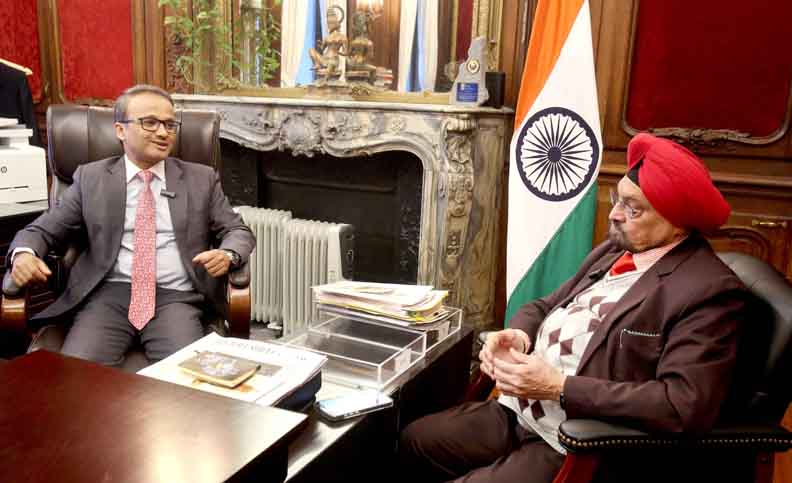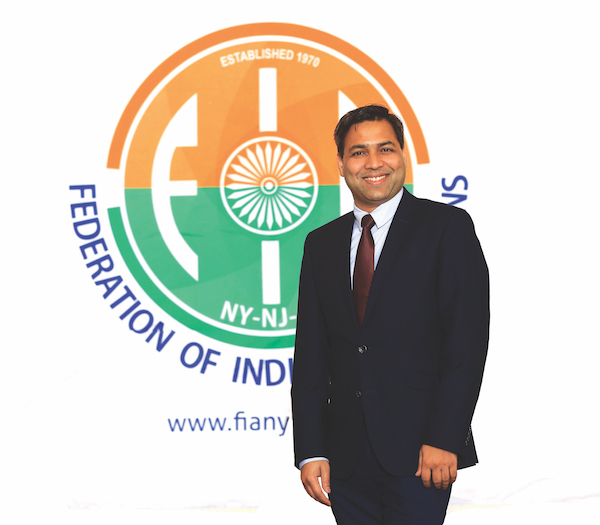
Mr. Binaya Srikanta Pradhan took over as Consul General of India at New York on January 15, 2024. He is a career diplomat of the 2002 batch of the Indian Foreign Service. He speaks English, Russian, Hindi, and Odiya languages. His diplomatic career includes senior roles in Indian Embassies in Moscow, Turkmenistan, and Pakistan from 2004 to 2012. During 2012-14, he managed India’s relations with Afghanistan and Iran at the Ministry of External Affairs, New Delhi.
From 2014 to 2019, Mr. Pradhan served as the Chief of Staff to the Minister of Petroleum & Natural Gas, Government of India. His international engagements extended to being the Deputy Chief of Mission in the Embassy of India, Moscow, from June 2019 to July 2021.
Prior to his current role as Consul General of India, New York, he held the position of High Commissioner of India to Tanzania and Permanent Representative to the East African Community (EAC) from August 2021 to January 2024. During this period India- Tanzania relationship was elevated to ‘Strategic Partnership’ and the first overseas campus of the prestigious Indian Institute of Technology (IIT) Madras in Zanzibar, Tanzania was set up.
Mr. Pradhan demonstrates a keen interest in economic and energy diplomacy. Beyond his diplomatic pursuits, he finds enjoyment in playing golf. Mr. Pradhan is married to Ms. Monalisa and they are proud parents of two daughters, Dibyanshi and Diya.
Four days after joining the present position, on the 19th January, 2024, in an interview with the Editor of The Indian Panorama Prof. Indrajit S Saluja, Consul General Pradhan spelt out in brief his priorities which included nourishing and strengthening the already strong bonds between India and the US, and exploring new areas of cooperation and relationship in diverse fields of economy, trade, technology, and culture etc. Mr. Pradhan added that serving the Indian Diaspora remained the primary focused concern of the Consulate. The strengthening of the multi-stake holders relationship will be another priority, he said.
The long interview is being released in two parts. The first one, being presented in this edition, deals with Mr. Pradhan’s views on India’s foreign policy, situations in India’s neighborhood, and India’s relations with the neighboring countries.
The second part, dealing with the contribution of the Indian American Diaspora in strengthening India-US relations and in promoting business and cultural relations between the two countries, and the consular services will be published next week. Stay tuned.
Here are excerpts from part one of the interview.

TIP: You’re welcome here to New York and this is our first meeting. And this is the time to know you, and what vision you have, what you would like to do here. As I said a little while ago, informally., there is a vast difference between your past experience and the experience that you would be having here. So, you might have thought of what exactly do you want to do here, and how you want to go about the whole thing? So, with that, the ball is in your court.
CG: Thank you, Professor Saluja. It’s a real pleasure to meet you and through you to talk to the readers of the Indian panorama. I’m familiar with your publication. I have heard good things, great things about your publication. So, it’s a real pleasure and honor to speak to you and to your readers through you. I would say you are right. The landscape is different. I was working in Tanzania, which is a big country in its own right. And you know, the relationship between India and Tanzania is quite spectacular, very good relationship. It’s a strategic partnership. We have a lot of history between our two countries but I entirely agree, coming to this part of the world, it’s a very different landscape. And as you mentioned during that informal conversation, it’s about 2.5 million Indian diaspora here and it’s a diaspora which is very well connected to India, both culturally, economically, and they have been very active. They have been playing a very critical role as a force multiplier to bring our two countries together. So, when I knew that I’m coming to this assignment, I understood the enormity of the task, I understood that it’s a very well-developed relationship. And coming here, one is to be better prepared to contribute in this ever-growing relationship between India and the US. As you know, I look after 10 states, I represent India in the Northeastern 10 states. And when I was looking at the profile of these 10 States, when I was looking at the profile of Indian diaspora, profile of the Indian businesses here in these 10 states, the economic linkages between these 10 states with India, I found that it’s a very active, very organic relationship. The India US trade is growing every year in double digits, and this region, these 10 states, are contributing in a larger way into that economic engagement. Even when you look at the profile of the Indian diaspora here, very accomplished people, people who have contributed to economic sphere, cultural sphere, intellectual sphere. Look at any aspect, you find the Indian diaspora has contributed richly in that and the great thing is that they are not limited to the United States alone. Now, they are also, you know, linked very well to India. And they are becoming the robust bridge, I would say, several bridges in different aspects, between our two countries. In this backdrop, when I look at my job, I would say that my job would be to strengthen this existing relationship. When we say that we are also working on KPIs -key performance indicators, and we are generally told that, no, we should work on trade; we should work on tourism, we should work on talent, we should work on technology. So, we call these four T’s. I would say they are going to remain pointers for me to strengthen our relationship on the four T’s. The good work done by my predecessors, the good work done by the ambassador of India in Washington, DC, my job is to continue that tradition, to strengthen what has been done. So, broadly speaking, to answer your question, I would say, I would continue the good work that has been done, but also to identify areas where we can strengthen our relationship, areas where we can bring the Indian communities closer to what is happening in India, and the Indian, economic and business entities closer to what is happening over here. That will be my broad agenda. But I think, two or three months down the line, if we sit down again, I will have better statistics, better understanding to tell you exactly what I have understood by then. As you know, this is my first week, so, I’m kind of trying to come to grips with the situation.
TIP: If I’m not mistaken, you have left a legacy in Tanzania. Probably, you are the architect of a wonderful relationship between Tanzania and India, with India having given Tanzania strategic partner status. That was during your time. Would you like to tell our readers how you managed the whole thing?
CG: It’s less about me doing that. It’s more about the profile of the relationship between India and Tanzania. As you would see, if you if you look at the geography, India and Tanzania are connected by Indian Ocean, and the Indian diaspora is present there for more than 200 years. They used to do trade 2000 years back. There is an archaeological finding on that. But we have a 200-year-old diaspora there, which is primarily from Gujarat and Punjab. So, the Sikh community, which is 150-year-old , went to do the railways projects in Kenya and Tanzania. There were others who went to do business. They did not only contribute to economic building blocks of the country, rather they have contributed in a big way in the entire nation building, whether it comes to institution building, building hospitals, roads, schools. Indian communities contributed in every way. But the other aspect is that Tanzania also welcomed them with open arms. They were always treated as part of Tanzania. So, there is a very nice symbiotic relationship between Indian diaspora and East Africa. And when I went there, I found that the warmth and the depth of relationship is already there. And we are doing so good in political engagement. Tanzania was the fourth biggest trade partner of India. When it comes to development partnership, we are spending a billion dollar on water projects alone in Tanzania. We are giving the highest number of scholarships to Tanzanian students. So, like I said the necessary condition was already there. And on top of that, we decided to set up the overseas IIT – Indian Institute of Technology outside India, in Tanzania. And if you look at the context, this is the time when the Prime Minister is talking about global south. This is the time when the Prime Minister is leading G-20. And he’s bringing the whole agenda of global south to the forefront of G- 20. So, what better can be in terms of an example that you take the most premier Indian engineering institute IIT to a country in global south? And if you ask me why Tanzania in entire Africa among the 54 countries, I will say Tanzania is the place which was the gateway for Indians for more than 200 years to reach out to Africa when Indians would go to Africa. They were actually entering Zanzibar and that’s the reason why we chose Zanzibar as the place for IIT. I will say, announcing India – Tanzania relationship as strategic partnership was a very natural thing to do at that point of time, and it was fitting into the larger priority of the government and the Prime Minister to develop a closer relationship with global south.
TIP: Will you allow me to jump from Tanzania to the two countries that are very much in the news today and about both the countries you have had probably a great understanding? One is Afghanistan, and the other is Iran. Would you like to give an account of your experiences and impressions of the political and economic aspects?
CG: Thank you for asking something which is close to my heart, Afghanistan. I haven’t served in any of these two countries. But I was looking up to these two countries from the headquarters. And because of that, I have visited both the countries more than 10 times. I have been to Afghanistan, maybe 15 times and Iran, maybe 12 to 14 times and to different cities in both the countries. It’s unfortunate that Afghanistan had to go through those difficult years, for no fault of theirs. And we were part of the solution. We were not part of the problem in Afghanistan. And when I was working on Afghanistan desk, our job was to provide the civilian support, to work with the communities there, to work with Afghanistan Government, to deal with the different ministries, different communities, different societies. And you know, we were doing iconic projects in Afghanistan. We were building their parliamentary building, the Salma dam to provide water to people. t I only wish that the country comes back to normalcy. Iran is a very different place. I used to deal with Iran. We have very strong ties with Iran. Our strategic relationship and our energy relationship are very deep and very old. And the cultural relationship is very strong. It’s a close partnership that we have.
TIP: Any comment from you about the recent conflict between Pakistan and Iran?
CG: You know, I’ve served in Pakistan. I spent two and a half years there, and the genesis of the problem between them goes a long, long time back, and , even at that point of time, you would hear about these problems. So, it’s just that the magnitude has gone up now, with both countries having kind of resorted to direct action into each other’s territory. But let me not make a comment on that. I personally believe that our region deserves peace and deserves peaceful means of solutions for every conflict. Because at the end of the day, we are all part of the developing world. Resorting to armed conflict drains out your precious resources. Things which can be used for development get used into armed conflict or get used into nonproductive things. I’m not being diplomatic here. I genuinely believe that, our region should focus more on development. And countries, the two countries that you mentioned, it would be ideal that they find peaceful means to resolve their differences. But this is not new, by the way. The basic thing is we all yearn for peace and development is possible only when there is peace, and development alone can bring happiness to people because if the development is there, then people have means to sustain themselves. So, India that way is doing the right thing, focusing on peace in the entire world. There may be problems with certain countries of course in the neighborhood, but hopefully, the policy that government of India is pursuing would probably result in lasting peace in at least in our area.
Watch the Interview.
https://www.youtube.com/watch?v=JYOEUcsvpY0
To be continued in Part 2 next week





Be the first to comment